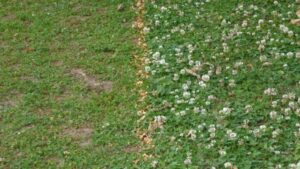Not only in field or vegetable crops, but also in the grass or potato sector, there has been an increase in illegal seed practices. These practices are at the basis of strong efforts by national, regional and global seed associations to halt these practices, among other things through raised awareness, and also by starting court cases against infringers.
Not Always The Same Variety
There are several kinds of illegal seed practices. At Breeders Trust we have a post control program, where seeds are bought, either risk based and/or randomly. These seeds are tested by a National Designated Authority (NDA) on their official trial and control farms. These targeted post control tests are showing that in fact seeds are sold officially certified, which are not true to type. This is the outcome of the Breeders Trust post control program in grasses, clover, mustard and fodder radish. Breeders Trust is investigating a case concerning multiplication of a red clover variety. Basic seeds were sent to the contract partner for multiplication. At our request the received seeds are tested in a laboratory with electrophoresis and the first impression is that the received seeds are not true to type. These clover seeds are growing at the moment on a trial and control field for confirmation.
Another type of illegal seed practices are the falsified labels, and unfortunately, we have discovered several seed lots with such labels. A third type of illegal seed practices is where farm saved seed is used of a variety that is protected by plant breeders’ rights without paying royalties to the variety owner.
Congress Participation
Breeders Trust is closely involved in the actions that regional seed associations, such as Euroseeds, or global associations such as the International Seed Federation, are undertaking to decrease illegal seed practices. One of the major actions is to raise awareness. And this is certainly necessary, as we are seeing companies that are carrying out illegal seed practices, but they are still participating in major seed events, such as the regional or global seed congresses. And in my view, this should not be possible. It would be a strong signal when seed companies which are convicted in court are banned from congress participation. I do realize that at the moment, an ‘infringer free congress’ is a utopia. But let’s hope that we reach that stage in the near future. Wouldn’t it be great if we could witness that the seed sector can clean itself?!
Respect the Law

It is incredibly important that the seed sector works on this topic, because first of all, we need to support the seed companies which are respecting the seed legislations. Secondly, we cannot accept that seed companies earn money by disrespecting seed legislation. Allowing that to happen would undermine the confidence in the system. Thirdly, it is also unacceptable that because of illegal practices, seeds are sold at a price level that is unrealistic for the seed companies which are respecting the seed legislations. Another reason to continue working on this topic is out of respect for the farmers. The farmers pay more money for a variety with specific characteristics. For example, when the farmer buys a specific mustard variety to decrease the number of nematodes in the soil but instead, he receives a variety which increases the nematode population. That’s unacceptable.
I’d like to give some advice to upstanding seed companies who abide to the law. Here are my tips on how to spot illegal seeds:
- Monitor your fields during production, especially when it concerns seed production abroad. Just take that plane/train/car and visit the production fields where your variety is growing.
- When seeds arrive at your warehouse do an entry check! Unfortunately, the seed analysis report and certificate are not always the guarantee that the seeds are the variety which is stated on the label.
- Check the germination and purity in your laboratory. Check risk based selected the identity of the seeds which you have received, and verify whether it is indeed your variety.
On the other hand, in terms of advice to companies which are engaging in illegal seed practices, or are contemplating to do so, I’d like to say: just realize that authorities and seed companies are more and more aware and that they increase checks on seed production. When an honest seed company discovers that the seeds which are sent to them are not their variety, your chances of doing business with them in the future are very limited. And don’t forget, there is also the risk that the illegal seed practices are discovered by Breeders Trust. And when found guilty, this is always followed by a press release about the case.
Editor’s Note: Corné van Beers is Project Manager at Breeders Trust. More information about Breeders Trust can be found here: https://www.breederstrust.eu/













